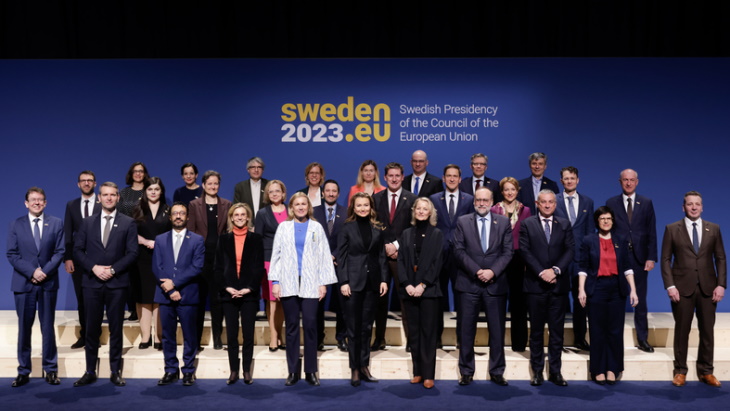EU energy ministers call for greater cooperation on nuclear
Energy ministers from 11 EU member states have called for a strengthening of European cooperation in the field of nuclear energy. The call came during an informal Council of Energy Ministers in Stockholm, Sweden, to discuss the energy market and energy supply, focusing on preparations for next winter and beyond.

EU energy ministers meeting in Stockholm (Image: European Council)
During the 27-28 February meeting, the ministers and high-level representatives of 11 member states - including Bulgaria, Croatia, Czech Republic, Finland, France, Hungary, the Netherlands, Poland, Romania, Slovakia and Slovenia - met with the European Commission and the Swedish Presidency to jointly reaffirm their desire to strengthen cooperation in nuclear energy.
"In accordance with the objectives of the Euratom Treaty, the promotion of research and the dissemination of technical information, the setting of uniform safety standards in line with international best practice and the strengthening of industrial cooperation in the development of European nuclear capabilities are important objectives of the common energy policy," France's Ministry of Energy Transition said in a statement.
The ministry said the ministers agreed to foster closer cooperation between their national nuclear sectors in order to ensure the best cooperation across supply chains and to explore joint training programmes and industrial projects, in order to support new projects, notably based on innovative technologies, as well as the operation of existing power plants. They also discussed the possibilities for increased scientific cooperation and the coordinated deployment of best practices in the field of safety.
"Nuclear energy is one of many tools to achieve our climate goals, to generate base-load electricity and to ensure security of supply," the French ministry noted.
The European Union comprises 27 countries across continental Europe which are committed to working together and sharing unrestricted trade. Member states of the EU have a wide range of views on the use of nuclear energy. EU policies do not stipulate future deployment levels of nuclear technologies, unlike for renewables. The EU depends on nuclear power for about one-quarter of its electricity.
Researched and written by World Nuclear News
- China Institute of Atomic Energy
- Nuclear Power Institute of China
- Southwestern Institute of Physics
- China Nuclear Power Operation Technology Corporation, Ltd.
- China Nuclear Power Engineering Co., Ltd.
- China Institute for Radiation Protection
- Beijing Research Institute of Uranium Geology (BRIUG)
- China Institute of Nuclear Industry Strategy (CINIS)
- China Nuclear Mining Science and Technology Corporation


